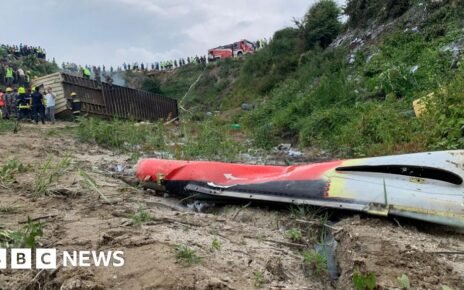[ad_1]
Four schoolchildren in South Africa are to face a disciplinary hearing over a viral video in which black students are seen being auctioned off as slaves, the authorities in Cape Town have told the BBC.
The footage, showing pupils in a cage while other students bid for them, caused outrage when it was shared on social media last Friday.
It was filmed at Pinelands High School and involved students in grade eight, which is the first year of secondary school when pupils are aged around 14.
The South African Human Rights Commission (SAHRC) has said it has opened its own investigation into the incident.
It comes as two other schools in the country – where white-minority rule ended three decades ago with the election of anti-apartheid fighter Nelson Mandela as president – are dealing with alleged racist incidents.
“It is disturbing that these incidences continue to occur 30 years into democracy,” the SAHRC said, adding it was even more distressing that they had occurred in schools.
The four Pinelands High School students believed to be behind the mock auction are currently suspended.
“The investigation is ongoing and nearing completion with 24 learners having been interviewed in the first two [school days] since the allegations were made,” Bronagh Hammond, spokesperson for the Western Cape Education Department, said on Wednesday in a statement sent to the BBC.
“Steps will also be taken against other learners who may have transgressed certain provisions within the code of conduct,” she added.
The incident first came to light after one of the pupils showed the footage to his mother, Merle Potgieter, who then told the school’s management and local media.
She says her son, who is 14, fought off boys who were attempting to force him into the caged enclosure alongside other black boys who were already inside it.
According to Ms Potgieter the alleged perpetrators were coloured – which is a South African term meaning mixed-race.
In the footage of the mock auction, children can be heard calling out various bids of up to 100,000 rand ($5,400; £4,200).
“Going once… going twice… sold!” one boy can be heard shouting.
Counselling support had been prioritised for those affected – and all grade eight pupils had had debriefing sessions, Ms Hammond said.
Slavery in Cape Town dates back to the 1650s when the Dutch colonised the peninsula and thousands of enslaved people were brought to the region from south-east Asia, Madagascar and Mozambique.
Today Cape Town is considered one of the most racially segregated and unequal cities in South Africa, despite its multi-ethnic mix.
This is due to the legacy of apartheid, when the white regime in the 1950s pushed black and mixed-raced communities into segregated townships outside the city.
The apartheid government also entrenched a racial hierarchy, which put black people right at the bottom.
On Tuesday, MP Makhi Feni, chair of the parliamentary committee on education, urged the schools at the heart of the latest scandals to “consider meaningful programmes that will foster social cohesion and South African-ness”.
“The question we all ought to ask genuinely is what emboldens a person, hardly a teenager, with no knowledge of where we come from as a country, to act in a manner that points to racism. Surely, our children are not and should not be racist,” he said.
Meanwhile, the opposition Economic Freedom Fighters (EFF) party is demanding that the pupils be suspended for at least two years and perform “community service in black areas”.
It has threatened to call protests and shut down the school if it finds the authorities’ ultimate handling of the incident less than satisfactory.
[ad_2]
Source link



